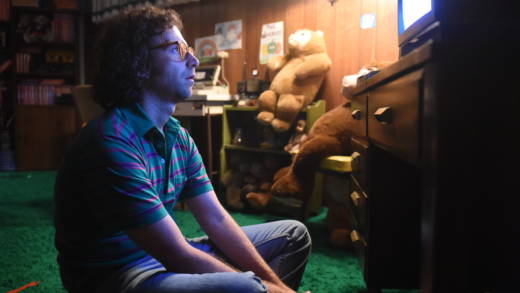If Barney the Dinosaur also played all five members of Voltron, he would look something like Brigsby Bear, a man in a giant teddy bear suit who stomps around against an outer-space backdrop blinking his animatronic eyes and learning lessons. Brigsby Bear Adventures has been on the air for some time, and the substance of those lessons has evolved from simple arithmetic to advanced scientific concepts, often accompanied by a telling refrain: “Curiosity is an unnatural emotion.”
Before we get curious, first a warning. It’s fitting that a film about the ways entertainment can damage our psychology would be super-spoilery. There’s a giant “twist” in Brigsby Bear that occurs shortly after the film starts, one the marketing materials have smartly chosen not to reveal. And for those who haven’t had it told to them, it’s worth going into the film completely in the dark, much like its protagonist is at the beginning.
But a review that only talks about the first five minutes of a movie, and labels the rest off-limits, is just stunting its reader’s maturity. So consider this a word of warning: What follows will set you free.
We know about Brigsby only through his number-one fan, the gawky overgrown child James Pope (Saturday Night Live‘s Kyle Mooney), who lives in an underground bunker with parents Ted and April (Mark Hamill and Jane Adams). James never leaves the bunker, because he’s been told there’s nothing outside but danger; instead, he watches new Brigsby videos in his room via the VHS tapes that have been arriving mysteriously, like clockwork, his entire life. They’re low-rent affairs, but he’s totally satisfied, having — like Jim Carrey’s Truman in The Truman Show — never known any other world.




